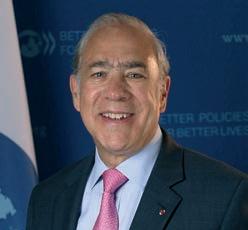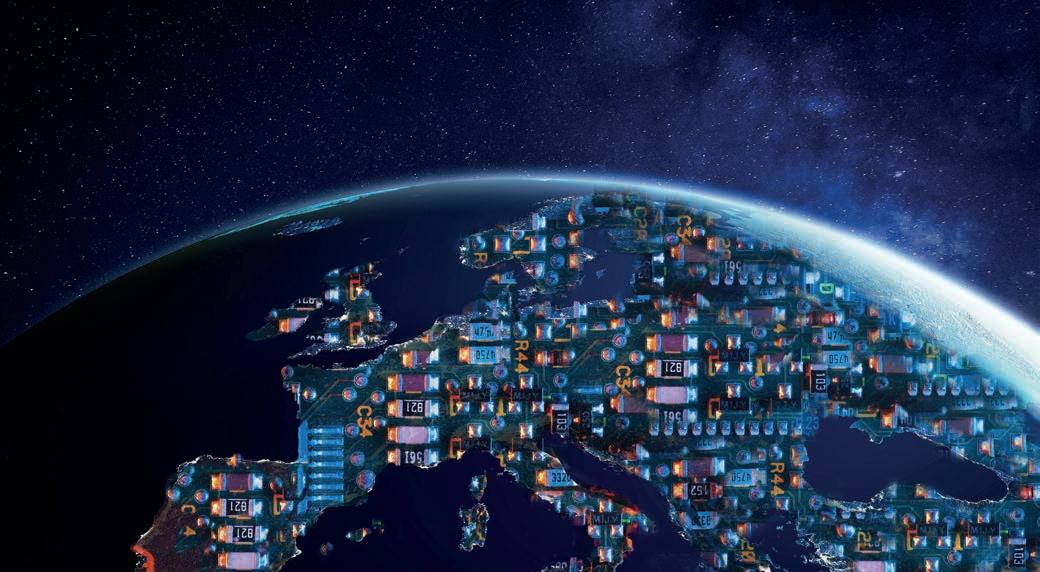GOING DIGITAL
Blockchain is a major technology of the 21st century Bruno Le Maire, Minister of the Economy and Finance, France* oe.cd/obs/2Tt
that the move from a centralised financial system to a decentralised one will happen much faster than people expect.
©OECD/Victor Tonelli
This is also true of the services sector. Because blockchain is not limited to the financial sector, as I often hear people say. It allows users to draw up smart contracts that can revolutionise the insurance sector. These contracts allow some tasks to be automated on behalf of consumers. For example, payments to policyholders could be made automatically in the event of a climate disaster. I think that the automatic activation of insurance contracts in the case of climate disaster, instead of a series of decisions authorising payments, represents a real step forward for policyholders.
Like all new technologies, blockchain is controversial. Some people say that it will be the most significant breakthrough technology of the 21st century. Others are telling us that it is a technological illusion. All I know is that most people talking about blockchain understand nothing about blockchain. […] Blockchain is a major technology for the future of France, Europe and the rest of the world. This is why I have, alongside the president of France, defined a clear blockchain strategy— something that was lacking in France just three or four years ago. […] Like any politician, I can be mistaken, but I am personally convinced that blockchain is the future, and will be a major technology of the 21st century. We need to take it seriously, to organise it and to make sure that the OECD’s member countries lead the way in its use. My first observation is that it could potentially transform a certain number of activities, which must be proof of its effectiveness. One such activity is financial services. Financial markets are based on a very complex architecture—marketplaces, clearing houses, settlement systems—and have just one purpose: ensuring the security of financial transactions. And blockchain technology can one day replace these highly complex infrastructures. It is a very promising technology for these financial services because it would allow an extraordinarily cumbersome and complex system of transaction certification to be replaced by a blockchain protocol. The protocol would be a complete, decentralised solution allowing people to carry out transactions, record the transactions and store the value connected to the transactions. It is no coincidence that a large number of fintech firms are developing this technology. You are aware of my determination to make French fintech firms the best in the world. When I look at the work of LiquidShare, for example, a French start-up, I am convinced
Blockchain can also transform the manufacturing industry. I would like to see this second [OECD Global Blockchain Policy] Forum share the message that blockchain technology is not limited to services: it is already operational in industry, in
The move from a centralised financial system to a decentralised one will happen much faster than people expect manufacturing and in industrial production. I believe it will transform all sectors and all processes of industrial production. Let us take the example of the food industry. The key issue here is product traceability. And blockchain provides an effective, incontestable solution for the total traceability of products throughout production and supply, all the way to the consumer, guaranteeing total confidence in the safety of the products. This is an absolutely huge step. With all of this, we need a strategy. Now that the use of blockchain is spreading to all sectors of economic activity, and, financial services to insurance through, and I insist on this, manufacturing, we must follow a strategy that allows us to control and regulate the technology. One of the major democratic challenges of the 21st century will be to calibrate the control and regulation of technology according to our values. Because it is the democracies that determine the value of the technology and not the technology that determines our values. This point is absolutely decisive if we want the advances in artificial intelligence, driverless cars and elsewhere to be accepted by the public. […] *This is a 650-word extract from speech by Bruno Le Maire, French Minister of the Economy and Finance, as delivered at the OECD Global Blockchain Policy Forum, OECD, Thursday 12 September 2019. For the full 3,500 word speech (English version), visit: https://oe.cd/obs/2Tt Watch the speech in French at https://oecd.streamakaci.com/blockchain2019/ Visit www.oecd.org/finance/oecd-blockchain-policy-forum.htm
OECD Observer No 319-320 Q3-Q4 2019
19

















